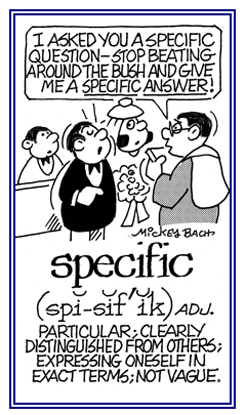2. Pertaining to particular people or situations: The counselor was presenting an educational plan which was specific for students who were planning to go to a university, or college, after they have graduated from high school.

Go to this Word A Day Revisited Index
so you can see more of Mickey Bach's cartoons.
2. The ability of a material to conduct electricity.
Metals are usually good conductors and nonmetals are poor conductors.
3. The measure of a material's ability to carry an electric current.An electric conductor is a material that, when placed between terminals having a difference of electrical potential, will readily permit the passage of an electric current.
Different materials have different degrees of conductivity, and their effectiveness is computed as the conductivity.
The best conductors are the metals; such as, silver, copper, aluminum, platinum, and mercury; however, nonmetallic substances: such as, carbon, saline solutions, and moist earth are also sufficiently conductive so that such properties are significant in certain situations.
Because of their cost and conductivity characteristics, copper and aluminum are widely used as conductors.
Copper is used more often than aluminum and its use is preferred for high-voltage transmission than aluminum, because of its lighter weight is a definite advantage.
Steel as a conductor is inferior to the other two materials mentioned; however its greater strength and resistance to wear have led to its choice as a conductor for special purposes; such as, that of power rail services on electrified railways, and as an inner core of copper or aluminum cables.
2. A contribution to the specific heat of a metal from the motion of conduction electrons.
